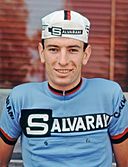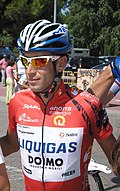
A | B | C | D | E | F | G | H | CH | I | J | K | L | M | N | O | P | Q | R | S | T | U | V | W | X | Y | Z | 0 | 1 | 2 | 3 | 4 | 5 | 6 | 7 | 8 | 9
In road bicycle racing, a Grand Tour is one of the three major European professional cycling stage races: Giro d'Italia, Tour de France, and Vuelta a España. Collectively they are termed the Grand Tours, and all three races are similar in format, being three-week races with daily stages. They have a special status in the UCI regulations: more points for the UCI World Tour are distributed in Grand Tours than in other races,[1] and they are the only stage races allowed to last longer than 14 days,[2] and these differ from major stage races more than one week in duration.
All three races have a substantial history, with the Tour de France first held in 1903, Giro d'Italia first held in 1909 and the Vuelta a España first held in 1935. The Giro is generally run in May, the Tour in July, and the Vuelta in late August and September. The Vuelta was originally held in the spring, usually late April, with a few editions held in June in the 1940s. In 1995, however, the race moved to September to avoid direct competition with the Giro d'Italia.
The Tour de France is the oldest and most prestigious in terms of points accrued to racers of all three,[1] and is the most widely attended annual sporting event in the world.[3] The Tour, the Giro and the Road World Cycling Championship make up the Triple Crown of Cycling.
The three Grand Tours are men's events, and as of 2023, no three week races currently exist on the women's road cycling circuit. The Vuelta Femenina, Giro d'Italia Women and Tour de France Femmes are sometimes considered to be equivalent races for women – taking place over shorter, smaller routes around a week in length. The Vuelta Femenina was first held under that name in 2023, the Giro d'Italia Women was first held in 1988, and various women's Tour de France events have taken place since 1984 – with the Tour de France Femmes having its first edition in 2022.
Description
In their current form, the Grand Tours are held over three consecutive weeks and typically include two rest days near the beginning of the second and third weeks. If the opening stages are in a country not neighbouring the home nation of the race, there is sometimes an additional rest day after the opening weekend to allow for transfers. The stages are a mix of long massed start races (sometimes including mountain and hill climbs and descents; others are flat stages favoring those with a sprint finish) and individual and team time trials. Stages in the Grand Tours are generally under 200 kilometres in length.
UCI rules regarding 'Grand Tours'
Grand Tour events have specific rules and criteria as part of Union Cycliste Internationale (UCI) regulations. For the UCI World Tour, more points are given in grand tours than in other races; the winner of the Tour de France receives 1000 points, and the winners of the Giro and Vuelta receive 850 points. Depending on the nature of other races, points vary for the winner of the overall classification[1] The grand tours have a special status for the length: they are allowed to last between 15 and 23 days – whereas other stage races are not allowed to last longer than 14 days.[2]
Teams
Historically, controversy surrounds which teams are invited to the event by the organiser. Typically, the UCI prefers top-rated professional teams to enter, while operators of the Grand Tours often want teams based in their country or those unlikely to cause controversy. Between 2005 and 2007, organisers had to accept all ProTour teams, leaving only two wildcard teams per Tour. However, the Unibet team, a ProTour team normally guaranteed entry, was banned from the three Grand Tours for violating gambling advertising laws. In 2008, following numerous doping scandals, some teams were refused entry to the Grand Tours: Astana did not compete at the 2008 Tour de France and Team Columbia did not compete at the 2008 Vuelta a España.
Since 2011, under the UCI World Tour rules, all UCI WorldTeams are guaranteed a place in all three events, and obliged to participate, and the organisers are free to invite wildcard teams of UCI ProContinental status to make up the 22 teams that usually compete.[citation needed]
Competitions
The main competition is the individual general classification, decided on aggregate time (sometimes after allowance of time bonuses). There are also classifications for teams and young riders, and based on climbing and sprinting points, and other minor competitions. Five riders have won three individual classifications open to all riders (general, mountains, young and points classifications) in the same race: Eddy Merckx in the 1968 Giro d'Italia and 1969 Tour de France and 1973 Vuelta a España, Tony Rominger in the 1993 Vuelta a España, Laurent Jalabert in the 1995 Vuelta a España, Marco Pantani in the 1998 Giro d'Italia, and Tadej Pogačar in the 2020 Tour de France and 2021 Tour de France.
Riders
It is rare for cyclists to ride all grand tours in the same year; in 2004, 474 cyclists started in at least one of the grand tours, 68 of them rode two Grand Tours and only two cyclists started in all three grand tours.[4] It is not unusual for sprinters to start each of the Grand Tours and aim for stage wins before the most difficult stages occur. Alessandro Petacchi and Mark Cavendish started all three Grand Tours in 2010 and 2011, respectively, as did some of their preferred support riders. For both riders in both years, only the Tour de France was ridden to its conclusion.
Over the years, 34 riders have completed all three Grand Tours in one year: Adam Hansen did so six years in a row. The only riders to have finished in the top 10 in each of the three tours during the same year are Raphaël Géminiani in 1955 and Gastone Nencini in 1957.
Riders from the same country winning all three Grand Tours in a single year has happened only on three occasions. It first occurred in 1964 with French riders Jacques Anquetil and Raymond Poulidor, with the second occurrence in 2008 with Spanish riders Alberto Contador and Carlos Sastre. 2018 marked the only time three different riders from the same country won all three Tours, these being British riders Chris Froome, Geraint Thomas and Simon Yates.
On four occasions, each of the three Grand Tours in the same year was won by a home rider, that is, an Italian winning the Giro, a Frenchman winning the Tour and a Spaniard winning the Vuelta. The last occasion this occurred was 1975.
Women's Grand Tour events
As of 2023[update], no three week races currently exist on the women's road cycling circuit. Historically, women have participated in three week long stages races, with various women's Tour de France events taking place since 1984.[5][6] In the contemporary UCI Women's World Tour, the Giro d'Italia Women (first held in 1988), the Tour de France Femmes (first held in 2022) and the Vuelta Femenina (started in 2015, gaining its current name in 2023) are sometimes considered to be equivalent races for women – taking place over shorter, smaller routes around a week in length.[7][8] The Vuelta Femenina takes place in May, the Giro d'Italia Women is generally run in late June / early July and the Tour de France Femmes is held in late July following the men's Tour de France.
Some media and teams have referred to these women's events as Grand Tours, as they are the biggest events in the women's calendar.[9][8][10] However, they are not three week stage races, they do not have a special status in the rules and regulations of cycling (such as more points in the UCI Women's World Tour, or allowing an increased number of stages),[11][12] and some have argued that the races need to visit high mountains (such as the Alps) or contain time trial stages to be considered an equivalent event.[9][13]
Campaign groups such as Le Tour Entier and The Cyclists' Alliance continue to push organisers and the UCI to allow for longer stage races for women,[12] as well as to improve the quality and economic stability of the women's peloton to allow for three week long races in future.[13][14]
General Classification winners
Wins per year
| Legend | |
|---|---|
| Rider won 3 Grand Tours in the same year | |
| Rider won 2 Grand Tours in the same year | |
| Flag icon key: List of National Flags | |







